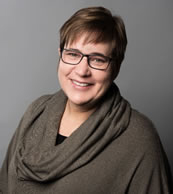 Suzanne O'Hara is a senior contaminant hydrogeologist with Geosyntec Consultants based in Ontario Canada. She has over 20 years of field and project management experience focusing on remediation of groundwater and soil containing recalcitrant compounds using innovative and more conventional technologies. She has directed, managed, or provided technical support for multiple projects ranging from overall strategy development, site investigation, remedial design, costing and implementation, contaminant fate and transport, and conceptual site model (CSM) development. Her technical experience involves dense non-aqueous phase (DNAPL) fate and transport in fractured media and the design, implementation and interpretation of innovative in situ remediation technologies for complex contaminated sites. Suzanne's remediation technology experience includes enhanced in situ bioremediation (EISB), in situ chemical oxidization (ISCO) and reduction (ISCR), Self-sustaining Treatment for Active Remediation (STAR) thermal remediation, passive treatment using zero-valent iron barriers, and reductive dechlorination using emulsified zerovalent iron (EZVI) for DNAPLs. Suzanne has been involved in ITRC since 2017 as a team member of the Optimizing Injection Strategies and In Situ Remediation Performance team. Suzanne earned a bachelor's degree in Earth Science (geology) from the University of Waterloo, Ontario, in 1994 and a master's in Hydrogeology from the University of Waterloo, Ontario, in 1997. Suzanne is a Professional Geoscientist in Ontario and a Professional Geologist in New York.
Suzanne O'Hara is a senior contaminant hydrogeologist with Geosyntec Consultants based in Ontario Canada. She has over 20 years of field and project management experience focusing on remediation of groundwater and soil containing recalcitrant compounds using innovative and more conventional technologies. She has directed, managed, or provided technical support for multiple projects ranging from overall strategy development, site investigation, remedial design, costing and implementation, contaminant fate and transport, and conceptual site model (CSM) development. Her technical experience involves dense non-aqueous phase (DNAPL) fate and transport in fractured media and the design, implementation and interpretation of innovative in situ remediation technologies for complex contaminated sites. Suzanne's remediation technology experience includes enhanced in situ bioremediation (EISB), in situ chemical oxidization (ISCO) and reduction (ISCR), Self-sustaining Treatment for Active Remediation (STAR) thermal remediation, passive treatment using zero-valent iron barriers, and reductive dechlorination using emulsified zerovalent iron (EZVI) for DNAPLs. Suzanne has been involved in ITRC since 2017 as a team member of the Optimizing Injection Strategies and In Situ Remediation Performance team. Suzanne earned a bachelor's degree in Earth Science (geology) from the University of Waterloo, Ontario, in 1994 and a master's in Hydrogeology from the University of Waterloo, Ontario, in 1997. Suzanne is a Professional Geoscientist in Ontario and a Professional Geologist in New York.
 Suzanne O'Hara is a senior contaminant hydrogeologist with Geosyntec Consultants based in Ontario Canada. She has over 20 years of field and project management experience focusing on remediation of groundwater and soil containing recalcitrant compounds using innovative and more conventional technologies. She has directed, managed, or provided technical support for multiple projects ranging from overall strategy development, site investigation, remedial design, costing and implementation, contaminant fate and transport, and conceptual site model (CSM) development. Her technical experience involves dense non-aqueous phase (DNAPL) fate and transport in fractured media and the design, implementation and interpretation of innovative in situ remediation technologies for complex contaminated sites. Suzanne's remediation technology experience includes enhanced in situ bioremediation (EISB), in situ chemical oxidization (ISCO) and reduction (ISCR), Self-sustaining Treatment for Active Remediation (STAR) thermal remediation, passive treatment using zero-valent iron barriers, and reductive dechlorination using emulsified zerovalent iron (EZVI) for DNAPLs. Suzanne has been involved in ITRC since 2017 as a team member of the Optimizing Injection Strategies and In Situ Remediation Performance team. Suzanne earned a bachelor's degree in Earth Science (geology) from the University of Waterloo, Ontario, in 1994 and a master's in Hydrogeology from the University of Waterloo, Ontario, in 1997. Suzanne is a Professional Geoscientist in Ontario and a Professional Geologist in New York.
Suzanne O'Hara is a senior contaminant hydrogeologist with Geosyntec Consultants based in Ontario Canada. She has over 20 years of field and project management experience focusing on remediation of groundwater and soil containing recalcitrant compounds using innovative and more conventional technologies. She has directed, managed, or provided technical support for multiple projects ranging from overall strategy development, site investigation, remedial design, costing and implementation, contaminant fate and transport, and conceptual site model (CSM) development. Her technical experience involves dense non-aqueous phase (DNAPL) fate and transport in fractured media and the design, implementation and interpretation of innovative in situ remediation technologies for complex contaminated sites. Suzanne's remediation technology experience includes enhanced in situ bioremediation (EISB), in situ chemical oxidization (ISCO) and reduction (ISCR), Self-sustaining Treatment for Active Remediation (STAR) thermal remediation, passive treatment using zero-valent iron barriers, and reductive dechlorination using emulsified zerovalent iron (EZVI) for DNAPLs. Suzanne has been involved in ITRC since 2017 as a team member of the Optimizing Injection Strategies and In Situ Remediation Performance team. Suzanne earned a bachelor's degree in Earth Science (geology) from the University of Waterloo, Ontario, in 1994 and a master's in Hydrogeology from the University of Waterloo, Ontario, in 1997. Suzanne is a Professional Geoscientist in Ontario and a Professional Geologist in New York.